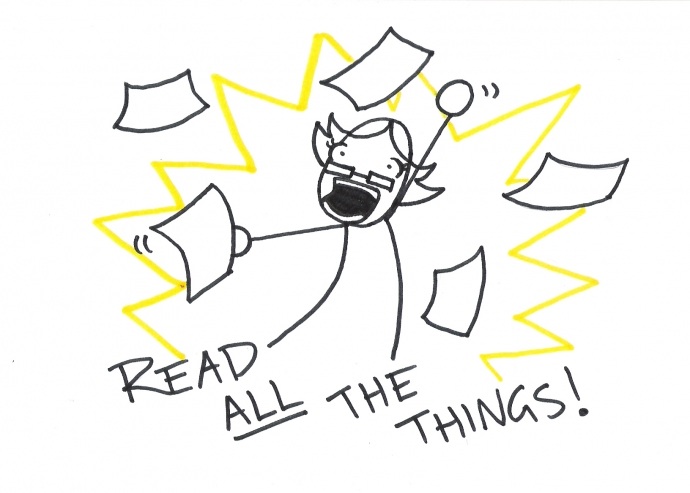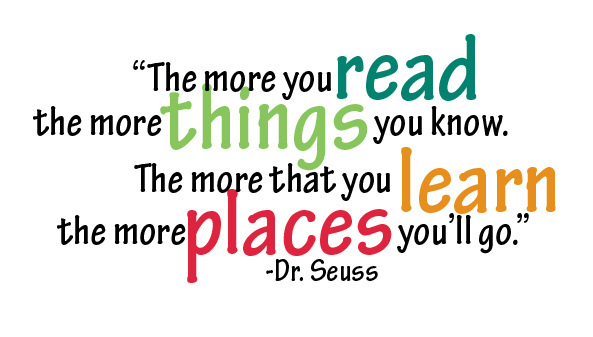Nobody had told the undergraduate students not to do all of the reading.
Here I was, one of five grad students in a course that was inexplicably open to undergraduates but taught by one of the most difficult instructors I've ever had the distinct displeasure to find myself sitting across from. Week after week I saw the younger students making excuses for not doing all of the reading, or - worse- actually doing all of the reading.
We were leaving class one day when one of the girls whispered to me frantically, "I don't understand how we're supposed to be able to read two books and three articles by next week, plus write a paper about the readings?!"
I checked to make sure the professor wasn't listening, took her aside, and told her the secret:
Don't.
Don't, under any circumstances, think you can actually get all of the reading done, plus your work for other classes, plus go to your part-time job, see your significant other, hang out with your friends, find time to exercise, and sleep.
In fact, the only way most students can get through most of the assigned reading is to be selective.
My golden rule was Read as little or as much as you need to understand.
So how do you know when to read everything, skip parts of books, and which assignments to omit all together?
Here I was, one of five grad students in a course that was inexplicably open to undergraduates but taught by one of the most difficult instructors I've ever had the distinct displeasure to find myself sitting across from. Week after week I saw the younger students making excuses for not doing all of the reading, or - worse- actually doing all of the reading.
We were leaving class one day when one of the girls whispered to me frantically, "I don't understand how we're supposed to be able to read two books and three articles by next week, plus write a paper about the readings?!"
I checked to make sure the professor wasn't listening, took her aside, and told her the secret:
Don't.
Don't, under any circumstances, think you can actually get all of the reading done, plus your work for other classes, plus go to your part-time job, see your significant other, hang out with your friends, find time to exercise, and sleep.
In fact, the only way most students can get through most of the assigned reading is to be selective.
My golden rule was Read as little or as much as you need to understand.
So how do you know when to read everything, skip parts of books, and which assignments to omit all together?
Read Everything
In some cases, you do need to read everything that is assigned.
First, is the workload reasonable and achievable? If the professor is asking you to read one chapter by next class, or a book in a week, yup, you've got time. Get it done.
Second, is this material important for you to know? If you're a history major and an instructor assigns anything by Marx, do yourself a favor and just frickin read it the first time around. I kept glossing over Marx as an undergraduate, only to have it come back and haunt me (repeatedly) as a grad student.
Third, do you find it interesting? Are you an anthro major and love learning about other cultures or a Literature major who devours books in single sittings? Then there's no reason not to devote a large amount of your scholarly energy to those classes and assignments that pique your interest. It's ok to enjoy some of your homework.
First, is the workload reasonable and achievable? If the professor is asking you to read one chapter by next class, or a book in a week, yup, you've got time. Get it done.
Second, is this material important for you to know? If you're a history major and an instructor assigns anything by Marx, do yourself a favor and just frickin read it the first time around. I kept glossing over Marx as an undergraduate, only to have it come back and haunt me (repeatedly) as a grad student.
Third, do you find it interesting? Are you an anthro major and love learning about other cultures or a Literature major who devours books in single sittings? Then there's no reason not to devote a large amount of your scholarly energy to those classes and assignments that pique your interest. It's ok to enjoy some of your homework.
Skip Some Parts
Do not skip assigned reading simply because you find the subject difficult or boring. In fact, the reason for skimming over some assignments should be because you want to spend more time delving into another course's readings.
Meaning, if you love all of your Japanese Literature classes, and you are merely taking Psych 101 to fulfill a requirement and get the heck out, then skipping reading for Psych should result in more time being invested in Japanese Lit.
Now, here's how you GET WORK DONE without actually getting ALL of your work done:
You'll have to test how this works in different courses. Some instructors also use this method for getting through their own reading and research, considering it an acceptable form of speed-reading. Others want to know precisely what So-and-So said on page 59, and you'll need to read more carefully.
Meaning, if you love all of your Japanese Literature classes, and you are merely taking Psych 101 to fulfill a requirement and get the heck out, then skipping reading for Psych should result in more time being invested in Japanese Lit.
Now, here's how you GET WORK DONE without actually getting ALL of your work done:
- Read the Introduction and Conclusion so you know the author's main arguments and points.
- Look at the Table of Contents and Index. One of my professors taught me this trick - it's a quick way to familiarize yourself with the buzzwords and topics associated with the text.
- Either read a bit from each chapter or pick a few chapters to read in depth. Some chapters are nicely organized so that you can read its main point at the beginning, find a few supporting points or examples in the pages following, and finish with a nice pithy summary at the end.
- See what others had to say about it by finding scholarly book reviews through JSTOR, noting what the reviewers flag as important points, gaps in the author's argument, or the context surrounding the book's publication.
You'll have to test how this works in different courses. Some instructors also use this method for getting through their own reading and research, considering it an acceptable form of speed-reading. Others want to know precisely what So-and-So said on page 59, and you'll need to read more carefully.
Skip It
In some rare instances, you can get away with not doing the reading at all.
If the workload is absurd - 2 books, a few articles, and a paper all due, as mentioned in the beginning - you can pick and choose a few articles to skip (or just glance over).
If the instructor never checks in with students and you feel like your time is wasted, both in and out of class, yes, you can skip the reading.
But before you do that, consider that it might be possible that you should read it anyway, even if your professor doesn't test you on it, for your own personal edification. Just because you don't have to read it, doesn't necessarily mean you should skip it.
Another option is to judiciously skip. Grad students do this a lot. You're mostly prepared, but then there's just one incredibly busy week where you say, let's be real, I can't and won't get all of this done. You show up to class and when your professor says, "Jessica, what did you think about the first article?" you can either bluff or be honest and reply, "I'm sorry, I didn't get to that one."
It's better to let the professor know before class starts if you didn't get to material that you are certain you will be called upon to discuss. You can offer your reason or apologies; some professors will be quite understanding, while others will think you're just making excuses.
The point is, before you decide to skip an assignment, you need to figure out if it's worth being exposed during a class discussion, or admitting to your professor prior to class, or possibly having to make up the reading at a later time because it will still be on the exam.
But if it seems like there will be no ramifications (your professor doesn't care and doesn't discuss the readings, it has no bearing on exams, or you have a valid excuse), then, yes, go ahead and skip it.
If the workload is absurd - 2 books, a few articles, and a paper all due, as mentioned in the beginning - you can pick and choose a few articles to skip (or just glance over).
If the instructor never checks in with students and you feel like your time is wasted, both in and out of class, yes, you can skip the reading.
But before you do that, consider that it might be possible that you should read it anyway, even if your professor doesn't test you on it, for your own personal edification. Just because you don't have to read it, doesn't necessarily mean you should skip it.
Another option is to judiciously skip. Grad students do this a lot. You're mostly prepared, but then there's just one incredibly busy week where you say, let's be real, I can't and won't get all of this done. You show up to class and when your professor says, "Jessica, what did you think about the first article?" you can either bluff or be honest and reply, "I'm sorry, I didn't get to that one."
It's better to let the professor know before class starts if you didn't get to material that you are certain you will be called upon to discuss. You can offer your reason or apologies; some professors will be quite understanding, while others will think you're just making excuses.
The point is, before you decide to skip an assignment, you need to figure out if it's worth being exposed during a class discussion, or admitting to your professor prior to class, or possibly having to make up the reading at a later time because it will still be on the exam.
But if it seems like there will be no ramifications (your professor doesn't care and doesn't discuss the readings, it has no bearing on exams, or you have a valid excuse), then, yes, go ahead and skip it.
Lest anyone think the takeaway point is Jessica says I don't have to do all of my homework!, I will be explicit: higher education requires a lot of outside learning from students, and, accordingly, asks them to be responsible for preparing themselves for class.
If you are confident in your ability to show up to class prepared to participate, discuss, and learn by reading only 3 out 4 of the assigned materials, skipping a reading, or glossing over some parts, then by all means, get through your work without getting through ALL of your work.
However, pay attention to which instructors, classes, and subjects require your full commitment, and take measures to get the work done.
Part of the Wednesday Link-Up hosted by Tilly's Nest!
If you are confident in your ability to show up to class prepared to participate, discuss, and learn by reading only 3 out 4 of the assigned materials, skipping a reading, or glossing over some parts, then by all means, get through your work without getting through ALL of your work.
However, pay attention to which instructors, classes, and subjects require your full commitment, and take measures to get the work done.
Part of the Wednesday Link-Up hosted by Tilly's Nest!






